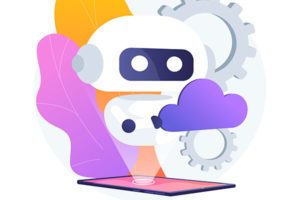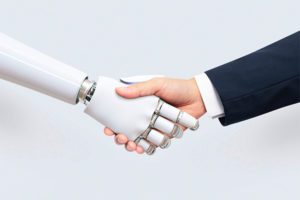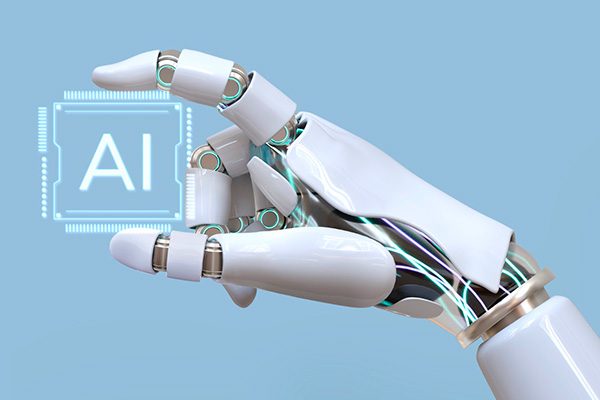Artificial Intelligence
The term ” Artificial Intelligence ” (AI) has entered the common language and has been much talked about in recent months.
Yet AI is not new… In reality this discipline at about sixty years. It brings together sciences, theories and techniques (mathematical logic, statistics, probability, computational neurobiology and computer science) and its goal is to make a machine imitate the cognitive abilities of a human being.
The term ” Artificial Intelligence ” was coined in 1955 by John McCarthy. In 1956, John McCarthy and his collaborators organized a conference called the Dartmouth Summer Research Project on Artificial Intelligence that gave birth to machine learning, deep learning, predictive analytics and, more recently, prescriptive analytics.
Today, this technology is making giant leaps: AI can solve calculations, drive, talk… Connected watches, social networks, text generators : we all use these machines on a daily basis, sometimes even without realizing it.

AI in our daily lives
Based on the analysis of our data, AI adapts all our tools to our image, and shows us only the information we want to see. This complex algorithm is used by search engines like Google : it answers your query in a few seconds…
Social networks are also equipped with artificial intelligence. Each network bases its own process on what is called: algorithm. It is based on the user’s history and consumption habits in order to refine the selections and always offer optimal content to the user.
You also find AI on the e-commerce sites you are used to frequenting: many merchants use artificial intelligence in the form of a chatbot to be able to effectively answer users’ recurring questions.
More and more vehicle models offer semi- or fully autonomous driving: again this is AI. The car is configured to analyze its surroundings in real time and make the best decisions in order to travel safely without the need for human action.
They can perform personalized actions according to the user’s requests and control other connected objects in his environment: voice assistants are omnipresent in our lives. These connected objects make it possible to facilitate daily actions within our homes.
Artificial intelligence also improves the performance of medicine by allowing users to monitor their health in real time. With connected watches , for example, it is possible to detect pathologies or health abnormalities. Thus, with the data collected, medical monitoring can be refined, more accurate, and it is possible to react more quickly in case of emergency.
Generate text using AI : Natural language processing and formatting have become very efficient. Whether it is to obtain a text responding to a specific theme, or a text optimized in SEO : properly used, content generators can meet the requirements of search engine algorithms or replace hours of research work for an exam.
AI is everywhere : it guides us in the selection of a film on a distribution platform, it makes us meet certain individuals on dating applications, it helps recruiters to discern the best candidates for a position…
The benefits of Artificial Intelligence
Artificial intelligence offers us considerable advantages.
AI technologies are extremely accurate and powerful, allowing us to access a large amount of data. AI analyzes them quickly to meet our demands and needs.
AI allows a computer to analyze any information in real time and make important decisions instantly.
In addition, she has the ability to learn continuously. Sophisticated IT systems are therefore able to perform complex tasks while being constantly updated with new technology or additional information that is constantly improving their performance.
When new models and algorithms are implemented, the result is pushed towards even more efficient and intelligent management, able to analyze market changes and emerging trends more quickly.
Smart robots can be programmed to automatically perform certain types of tasks without the need to be constantly controlled by a human operator. Automation not only allows companies to perform their processes more efficiently, but it also frees up employees’ time so they can focus on their day-to-day activities.
From health to transport, education, the environment, tourism and research… Artificial Intelligence is helping to accelerate advances in many areas. It has a major impact on the professional environment and tends to significantly improve our daily lives.

The disadvantages of AI
The disadvantages of artificial intelligence are very complex and cause a lot of concern among experts. The main problems related to its development are the possibility of overriding the control of human beings.
Many fear a threat to jobs.
AI is revolutionizing the way we live, and it could also lead to profound and lasting changes in society.
AI and robotization could lead to a loss of empathy and humanity, especially if used to replace humans in fields such as social work and education.
Questions arise about the protection of personal data and respect for individual privacy.
There is also the risk that sophisticated computer systems may unknowingly make discriminatory or abusive decisions that could directly affect vulnerable populations around the world.
Is AI dangerous?
In the wrong hands, it can obviously be used for criminal purposes or disinformation. Hacking autonomous cars or military drones, targeted phishing attacks , fabricated fake news or manipulation of financial markets… The list of possibilities is long when these AI tools are used for the wrong reasons.
If they are effective in improving our daily lives and helping us in daily tasks, they are just as effective in harming us or impacting our safety.
It is essential that researchers and developers work together to ensure accountability and transparency of AI systems. It is also important for AI users to understand the risks and possible consequences of using this technology.
We must be vigilant about this technology so that it does not become a source of social or economic injustice.


